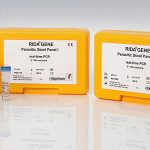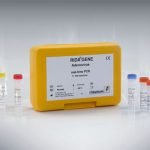Intended use:
For in vitro diagnostic use. RIDA®GENE Enterovirus is a multiplex real-time RT-PCR for the direct qualitative detection of Enterovirus from human stool samples and cerebrospinal fluid (CSF).
RIDA®GENE Enterovirus real-time RT-PCR is intended for use as an aid in diagnosis of infections caused by enteroviruses (poliovirus, echovirus, coxsackievirus, human enterovirus 70/71).
General information:
Enteroviruses belong to the family of Picornaviridae and according to the current classification enteroviruses are divided into 15 species (enterovirus A-L and rhinovirus A-C), whereby the species enterovirus E-L are not described as human pathogenic.The species enterovirus A includes the human enteroviruses A and the coxsackie viruses A, whereas the enteroviruses B include the human enteroviruses B, the coxsackie viruses B and also the echoviruses. Furthermore, the human enteroviruses C, the coxsackie viruses C and the polioviruses are part of the species enterovirus C. Enteroviruses mainly infect infants and small children and are transmitted via the fecal-oral route but also sometimes by droplet infection and contaminated water. Most enterovirus infections are asymptomatic or present with mild cold-like symptoms. Though, due to the multitude of enterovirus species the clinical presentation in severe symptomatic diseases is of broad variety. Severe enterovirus infections are poliomyelitis, hand-foot-and-mouth disease, meningitis and myocarditis.
Polioviruses are single-stranded RNA (ss-RNA) viruses and before their partial eradication they were distributed worldwide. Besides mild symptoms such as fever and cough, poliovirus can also cause poliomyelitis. Although, single outbreaks of poliomyelitis are reported consistently, the number of cases is declining worldwide. Thus, only 37 infections with poliovirus type 1 and no infections with poliovirus type 3 were reported in 2016. Poliovirus type 2 is regarded as eradicated since September 2015.
In 1984, coxsackie virus A and B were first reported and named after their place of detection in Coxsackie, New York. Coxsackie viruses are present worldwide and both strains can cause the so called “summer diarrhea”. In the US, the hand-foot-and-mouth disease is mostly caused by coxsackie virus A16 whereas other severe coxsackie infections lead to conjunctivitis and myocarditis. Besides coxsackie virus, also an infection with human enterovirus 70 can lead to an acute conjuncitivitis.
Human enterovirus 71 causes hand-foot-and-mouth disease, however infections with human enterovirus 71 are asymptomatic in most cases. This single-stranded RNA (ss-RNA) virus is distributed worldwide and most often occurs in late summer and fall.
Echovirus is highly infectious and occurs mostly in children. Echovirus can, besides others, lead to aseptic meningitis whereby echovirus 30 is the most common meningitis causing serotype in Europe, America and Asia.
| Art. No. | PG4705 |
|---|---|
| Test format | real-time RT-PCR with 100 reactions |
Dear customers,
we have started to provide the documents for our products in an electronic format. These are the Instructions for Use (IFU), the Safety Data Sheets (SDS) and the Certificate of Analysis (CoA). For batches placed on the market after 01 January 2023, you can find our documents on the eIFU portal eifu.r-biopharm.com/clinic.










